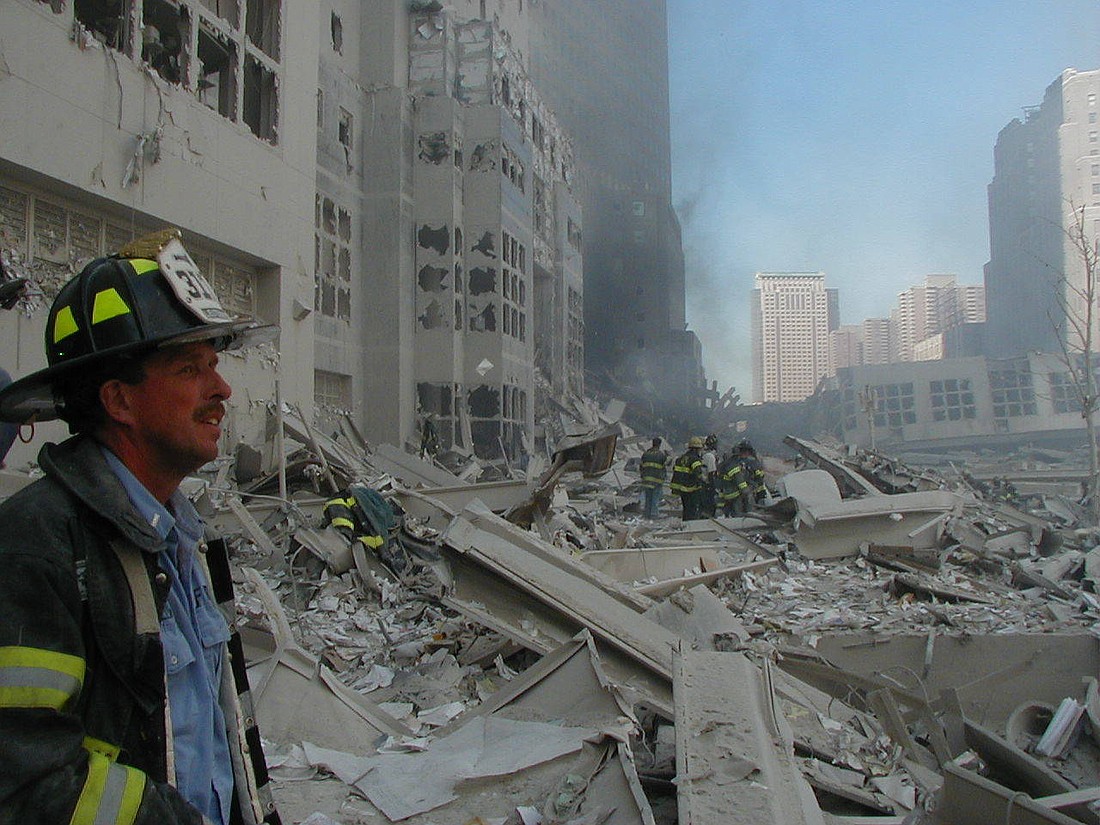- December 20, 2025
-
-
Loading

Loading

Robert Collis had the day off on Tuesday, Sept. 11, 2001.
He was at home when his phone rang. The voice on the other end instructed him to turn on his television.
When he did, Collis, like many Americans, watched the north tower of the World Trade Center burn.
But unlike many Americans, Collis, now a Longboat Key resident, couldn’t stay home.
He was a lieutenant of Engine Co. 317 of the New York City Fire Department. He got dressed and left to join his fellow firefighters.
It was eerie, Collis recalls now as the 16th anniversary of terror attacks approaches. The only other people on the road were fellow firefighters driving to help. The firefighters saw the lieutenant name tag on Collis’ shirt and yelled across the road asking where they should go.
He told them to go to their firehouses.
When Collis arrived at his, he watched the north tower collapse on TV.
“I was in the back of about 15 men, and I just blurted out, ‘We just lost over 100 firemen,’” he said. “Every head turned toward me, snapped toward me almost in disbelief and disdain that I would even say such a thing. That it was unthinkable, and I just shrugged. ‘Where do you think they are?’ and then a cold chill hit me.”
It was at that moment that Collis checked the time. It was between 9 and 9:30 a.m., which is usually when the night crew leaves and the day crew arrives. The crews plan it that way to avoid Manhattan traffic. He knew that everyone in the night crew would jump on the trucks with the day crew. It’s called riding heavy. That meant it was more likely that 200 or 300 firemen had died when the towers collapsed.
Collis packed his truck with firefighters and began driving toward City Hall. On their way, the second tower fell. Traffic was at a standstill. Collis and the firefighters he was with stopped a city bus and had the passengers get off and drove toward a park near City Hall where they were instructed to assemble. They didn’t stay long. The area was covered in dust. Paper and debris peppered trees. Collis told them they had to leave.
They started walking toward the World Trade Center. When they arrived, Collis couldn’t recognize the once-familiar layout of the land. He had worked as a credit manager in a hotel one of the towers fell on. In 1981, as a rookie fireman, Collis was assigned to Ladder 1, the closest truck company to the World Trade Center at that time.
The scene Collis walked into was a mix of chaos and confusion.
“It became so obvious that, essentially, there was nobody to rescue,” he said. “There were only six or so firemen that self-extracted themselves from the stairwell with one civilian. Beyond that, there was nobody. They were all gone.”
In the next 24 hours and the weeks that followed, Collis and the other firefighters spent 24 hours at a time working. Not a lot could be done by hand because all of the debris was connected. Wires were connected to cables, which were caught on steel, which was mixed with concrete. They worked to find and identify bodies.
Retired firemen joined those serving in searching the rubble. One day, as Collis was leaving his shift, he ran into an older man who wasn’t planning to leave. He told Collis he couldn’t leave because his son was still missing and he had to bring him home.
“These connections just kept going and going throughout this job,” Collis said. “Whose brother? Whose cousin? He just got promoted. He left the firehouse, and now he’s gone. And that was the city, too. I mean the civilians, they didn’t deserve that day.”
Sometime after 9/11, Collis was having lunch with a captain who was stuck in a stairwell during the attacks. Collis asked him what it was like. The captain began hitting his hand on the table, explaining that was what it sounded like when one floor collapsed onto another. Gradually, that clapping got quicker, until suddenly, the captain looked up and saw blue sky as smoke passed.
Collis said he would do it all over again if he had to. He became a captain shortly after 9/11, and knew the attacks sped up his promotion because so many in the ranks died that day. For that, he feels guilty, but he made it a mission to make every new firefighter feel welcome. Veteran firefighters gave him pushback for being so nice to the new guys, but Collis wouldn’t have it.
“‘I’m going to give them everything I can in terms of them fitting in right from day one because that’s what this job is all about,’” he said to his firefighters. “‘You would do it all over again, and even after 9/11, people are taking the job.’”
In 2010, Collis was given medical leave and forced to retire. His lungs weren’t strong enough to continue. His doctor told Collis he wouldn’t be going back to his firehouse.
“I begged the doctor, ‘Don’t do this to me,’” he said. “This is all that I am.”
Collis’ wife, Nora, said Collis has always been aware that going to work every morning might mean he wouldn’t come home at night, which is why he wasn’t looking for sympathy after 9/11. He, and all the other first responders, were just doing their jobs.
“Everybody felt sorry for the first responders, but he said, ‘This is what we do,’” she said. “‘We know this could be our last day, but the poor people, the moms and dads and brothers and sisters who just went to their desks, their offices, those are the victims.”